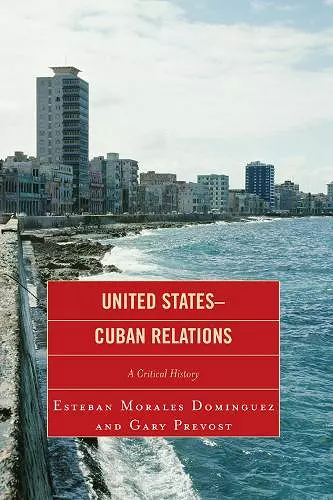United States-Cuban Relations
A Critical History
Esteban Morales Dominguez author Gary Prevost author
Format:Paperback
Publisher:Bloomsbury Publishing PLC
Published:7th Mar '08
Currently unavailable, and unfortunately no date known when it will be back

United States-Cuban Relations breaks new ground in its treatment of this long and tumultuous relationship. The overall approach, mirroring the political science background of both authors, does not focus on historical detail that has been provided by many other works, but rather on a broad analysis of trends and patterns that have marked the long relationship between the two countries. Dominguez and Prevost argue that U.S. policy toward Cuba is driven in significant measure by developments on the ground in Cuba. From the U.S. intervention at the time of the Cuban Independence War to the most recent revisions of U.S. policy in the wake of the Powell Commission, the authors demonstrate how U.S. policy adjusts to developments and perceived reality on the island.
The final chapters of the book focus on the contemporary period, with particular emphasis on the changing dynamic toward Cuba from U.S. civil society. Dominguez and Prevost describe how the U.S. business community, fearful of being isolated from Cuba's reinsertion in the world's capitalist markets, have united with long-standing opponents of the U.S. embargo to win the right to sell food and medicines to Cuba over the last four years. Ultimately, the authors are realists about the possibility of better relations between the U.S. and Cuba, pointing out that, short of the collapse of Cuba's current political and economic system, fundamental change in U.S. policy toward the island is unlikely in the immediate future.
Most experts would agree that Cuba's relationship with the United States during the last fifty years is probably the least understood aspect of contemporary Cuban history. Placing the relationship in historical context, Morales and Prevost provide a most useful and necessary overview of the origins and development of the relationship, which helps the reader understand the complexities, subtleties, and realities that have characterized U.S.-Cuba relations from Thomas Jefferson to George W. Bush. This highly readable, concise, and perceptive work of this most complex relationship is also timely, as the Cuban Revolution turns fifty, facing a sea of challenges, doubts, and uncertainties. Morales and Prevost must be commended for producing what is likely to become a standard for the study of U.S.-Cuba relations. -- Felix Masud-Piloto, DePaul University
Most Americans view Cuba as being almost providentially assigned to the US orbit, and thus view relations between the two nations since the onset of the Cuban Revolution as an aberration instead of a culmination. This slim, well-written volume will do a lot to dispel that notion....This work is especially strong in providing a new framework for understanding relations. It is also very strong in detailing relations since the 1991 collapse of the Soviet Union and the onset of the 'special period.' ...Recommended. * Choice Reviews *
This is a most readable account of U.S.-Cuban relations since 1959, i.e., of continuing U.S. efforts to dominate the island and of Cuba?s to thwart those efforts. The authors make the very useful point that U.S. policy cannot be explained simply as a device to assure the support of the Cuban-American community?a community which, in any event, is coming to have growing doubts about that policy. Rather, it has to do with a mind-set stretching back into early American history: that is, that in the rightful order of things, Cuba ought to be controlled by the United States. In that same context, the authors note that the neo-cons around Bush 'consider the continuation of the socialist project in Cuba to be an affront to their plans for U.S. global hegemony.' And thus, even though the Cold War is over, Bush?s policy toward Cuba has become even more threatening. Disappointed that Castro?s illness and semi-retirement did not result in serious discontent and perhaps even in regime overthrow, the neo-cons, according to the authors, are hoping his death will at last give them that prize. More likely, it will be their ultimate disappointment. -- Wayne S. Smith, senior fellow at the Center for International Policy and adjunct professor at Johns Hopkins University, former chief of the U.S. Interests Section in Havana (1979–1982)
This is a most readable account of U.S.-Cuban relations since 1959, i.e., of continuing U.S. efforts to dominate the island and of Cuba’s to thwart those efforts. The authors make the very useful point that U.S. policy cannot be explained simply as a device to assure the support of the Cuban-American community–a community which, in any event, is coming to have growing doubts about that policy. Rather, it has to do with a mind-set stretching back into early American history: that is, that in the rightful order of things, Cuba ought to be controlled by the United States. In that same context, the authors note that the neo-cons around Bush 'consider the continuation of the socialist project in Cuba to be an affront to their plans for U.S. global hegemony.' And thus, even though the Cold War is over, Bush’s policy toward Cuba has become even more threatening. Disappointed that Castro’s illness and semi-retirement did not result in serious discontent and perhaps even in regime overthrow, the neo-cons, according to the authors, are hoping his death will at last give them that prize.
More likely, it will be their ultimate disappointment.
ISBN: 9780739124444
Dimensions: 229mm x 155mm x 13mm
Weight: 268g
168 pages